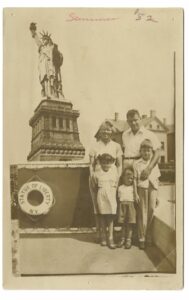Magazine

A Good American Family
by Katie Vloet
The cover of the book A Good American Family pictures, as one might expect, a good American family: dad, mom, one daughter, two sons, all posed on a ferry near the Statue of Liberty in the summer of 1952. But take a closer look at the subtitle of the book and the complicated subtext of the image comes into focus: The Red Scare and My Father.
David Maraniss’s new book looks back at a time in his family’s history that he, the youngest of the children in the photo, didn’t understand until he was an adult. His father, Elliott Maraniss, had been called before the House Un-American Activities Committee (HUAC) for being a communist just a few months before the Statue of Liberty visit.
“It is hard for me to overstate how much of a force for good he was . . . ,” David Maraniss writes in A Good American Family (Simon & Schuster, 2019). “But there was a time when Elliott Maraniss was a communist. I say this without hesitation, without shame or pride.” Elliott was a communist during his years as a student at the University of Michigan and beyond. He wrote articles in The Michigan Daily in which he sympathized with the Soviet Union, and he worked in communist organizations along with his wife, Mary.

The Maraniss family, with David in the center, poses on a ferry near the Statue of Liberty in the summer of 1952. The photo was used on the cover of David’s book, “A Good American Family: The Red Scare and My Father.”
But Elliott Maraniss was much more: a World War II veteran who commanded an all-black company in the still-segregated Army; a hard-working, thoughtful journalist; a beloved husband and father. He loved baseball and, the younger Maraniss says, “showed a deep belief in America and the American promise.” David Maraniss deftly contrasts his father’s devotion to his family and country with the unsavory qualities of some of the HUAC members: Committee Chair John Stephens Wood, for one, had belonged to the Ku Klux Klan and championed segregation, and had participated in the lynching of a Jewish industrialist who was falsely accused of murder. Yet Wood, Maraniss writes, “had the authority to question whether Elliott Maraniss was sufficiently American.”
David Maraniss—whose research was informed by visits to the Bentley Historical Library—returns to that theme often in the book. In discussions of his latest work during interviews and on his book tour, he also has drawn the parallels between the Red Scare and the current era of division and hate-speech in the United States. “The larger themes of the book are what does it mean to be an American, and who decides, and how fear is used as a tool,” says Maraniss, who has written bestselling biographies of Barack Obama, Vince Lombardi, and Bill Clinton, along with several other nonfiction books. The Pulitzer Prize winner is also an associate editor at The Washington Post.
Even before he began his research for the book, David Maraniss knew the rough outline of his father’s appearance before HUAC, which occurred when the committee took its hearings on the road to Detroit: He invoked the Fifth Amendment and refused to name others who were communists. He was fired from his job on the rewrite desk at the Detroit Times, blacklisted, followed for years by the FBI, and unable to find a steady newspaper job for another five years.
What David didn’t discover until conducting research for the book were the contents of a statement that his father had prepared to give to HUAC but was never allowed to read during the hearings.
“In the 34 years of my life, in war and peace, I have been a loyal, law-abiding citizen of the United States,” said a portion of Elliott Maraniss’s three-page statement. “ . . . I must sell my home, uproot my family, and upset the tranquility and security of my three small children in the happy, formative years of their childhood. But I would rather have my children miss a meal or two now than have them grow up in the gruesome, fear-ridden future for America projected by the members of the House Committee on Un-American Activities.” When David unearthed the statement in the HUAC files, 63 years after the hearing, he writes that he “started to absorb, finally, what I had never fully allowed myself to feel before: the pain and disorientation of what my father had endured.”
Maraniss’s research for the book took him around the country, including numerous trips to Ann Arbor. At the Bentley, he researched the Stanley M. Swinton papers for insight about student life and David Maraniss’s uncle, Bob Cummins, a fellow U-M student who fought against Franco in the Spanish Civil War; the Charles E. Potter papers for a better understanding of the member of HUAC who later wrote a book condemning the rise of McCarthyism (and who spoke the phrase to Elliott Maraniss that became the title A Good American Family); and the digitized archives of The Michigan Daily. If the Daily articles had not been digitized and therefore easily searchable, Maraniss estimates it would have taken him three months to get through them.
“The breakthroughs at Bentley were really from reading his editorials,” Maraniss says in an interview. “I knew he was an excellent writer, but I was really stunned by the sophistication of The Michigan Daily in that era. Some of the breakthroughs were, ‘C’mon, dad, how could you possibly rationalize the Soviet-Nazi pact?’ I got a better understanding of his thinking at the time, for better or worse. . . . I would say he was 80 percent a great writer and very thoughtful, and 20 percent naïve about the Soviet Union.”
His research at U-M did more than just provide data, quotes, and historical context. “The whole question was, could I put myself back in that time and place and understand what was going on,” Maraniss says. “The Bentley really helped me do that, to put myself in my father’s time.”
